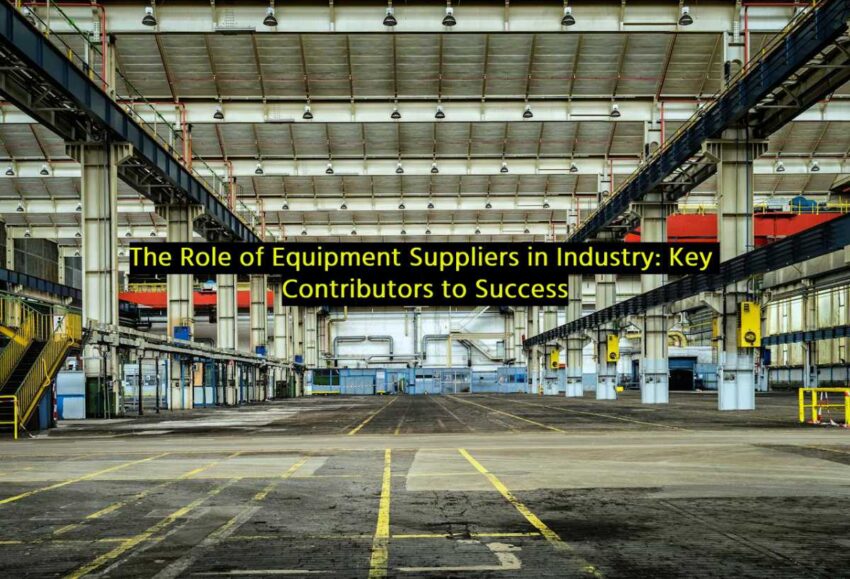Equipment suppliers provide a variety of products that help businesses run efficiently. These include warehouse handling equipment, such as forklifts and pallets, automated distribution technology, AI robots, and sorters.
Today’s industrial machinery & equipment manufacturers face complex supply chains with limited end-to-end supply chain visibility. Managing them successfully requires a team of well-qualified professionals, including engineering, program, and supply chain management.
Invest in Customer Service
When looking for an equipment supplier, it is important to weigh their reputation and the value that they bring to the table. The right supplier will help you optimize your material handling processes and be a valuable asset in helping you reach your operational goals.
Many suppliers track customer performance metrics, but few analyze the revenue and asset investment directly attributable to a particular customer. Moreover, most don’t establish prices that balance the supplier’s need for control with the customers’ need for flexibility.
An excellent example of this is Equipment-as-a-Service (EaaS). This model allows industrial customers to pay smaller subscription fees for access to machinery that reduces upfront costs and the risk of obsolescence. It also allows them to switch to a more advanced product version when necessary without the expense of a complete replacement. This type of service requires that the supplier provide adequate customer support to ensure a seamless transition. To that end, they should offer a procedure for managing equipment problems and provide information about their service coverage areas.
Invest in Safety
Every firm, from cleaning products supplier to construction contractors, must invest to generate profits, according to a well-known proverb in the business world. These same businesses, however, frequently present spending on new safety equipment, seminars, and education as an expense as opposed to an investment when they discuss funding for more safety initiatives.
The truth is that investing in workplace safety pays significant dividends. Workers who feel safe perform better, require less time off, and reduce insurance costs. In addition, businesses that focus on health and safety tend to attract more qualified applicants, which helps with employee retention and business growth.
Investing in workplace safety doesn’t just mean purchasing the proper PPE for your team members. Still, it also means providing comprehensive training and support, simplifying processes, rewarding positive behaviors, maintaining open communication, and conducting regular inspections.
Invest in Research and Development
Research and development (R&D) is a critical investment for companies seeking to gain a competitive advantage, expand their market share, drive efficiency, and encourage innovation. Investing in R&D also benefits the national economy, as new technologies flow from domestic R&D-intensive industries into the rest of the economy and boost overall productivity.
Companies invest in R&D to develop products and services that align with their target customer’s needs, preferences, and pain points. This results in improved product performance and enhances the company’s overall customer experience.
Specialized industrial equipment, such as shelving units or forklifts, requires extensive engineering and testing before it can be sold. Therefore, the supplier needs to have a robust supplier qualification process and supply chain management team to manage the sourcing and supply of engineered equipment. It includes providing presales activities, such as application assessment and product demonstrations. It also means establishing precise sourcing and procurement guidelines that outline expectations for delivering project milestones.
Invest in Training
In addition to supplying quality equipment, suitable suppliers will offer training on how to use the machines properly. They will also provide ongoing maintenance and support services to help their customers maintain high productivity and efficiency.
Training can also help to reduce safety risks and minimize downtime caused by equipment failure. It can help workers learn about company protocols and improve their performance, which leads to cost savings and improved profitability.
Buyers should always consider the budget when evaluating potential suppliers and finding suppliers that will provide the necessary equipment without exceeding the company’s limited resources. They should also be able to offer fast and flexible financing. It can make all the difference when obtaining critical pieces of industrial equipment. Choosing the best vendor is vital to achieving long-term success in the industry. By taking the time to research potential partners, buyers will benefit from the dependable equipment and financial stability that results from working with a trustworthy and reliable supplier.

An author of BlogMandi, We have published more articles focused on blogging, business, lifestyle, digital marketing, social media, web design & development, e-commerce, finance, health, SEO, travel.
For any types of queries, contact us on blogmandi.info@gmail.com

